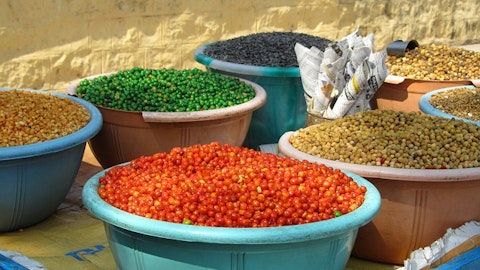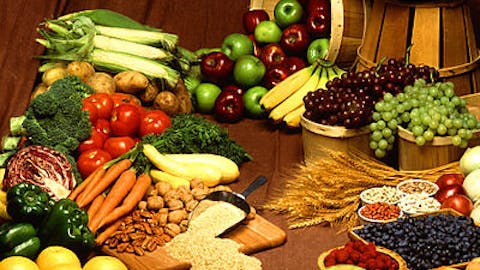In this article, we’ll take a look at the top 10 Best Foods to Lower High Blood Pressure (Hypertension) Naturally. For a detailed overview of the 25 best foods for lowering blood pressure, with insights into the blood pressure monitors market, read 25 Best Foods to Lower High Blood Pressure (Hypertension) Naturally.
10. Olive Oil
A comprehensive analysis conducted by Massaro, M., Scoditti, E., and fellow researchers on the effects of olive oil on blood pressure, published in the journal Nutrients, revealed that its high oleic acid and antioxidant polyphenol content make it an optimal fat choice for managing hypertension.
9. Pomegranates
Packed with antioxidants and dietary fiber, pomegranates can help fight inflammation and boost heart health. A meta-analysis conducted by Sahebkar, A., et al., published in the journal Pharmacological Research, concluded that drinking pomegranate juice can lower blood pressure. The reduction was seen no matter how long or how much juice was drunk, but larger amounts had a stronger effect. This suggests that pomegranate juice might be good for heart health.
8. Kiwifruit
Rich in bioactive substances, kiwifruit can enhance endothelial function, which plays a crucial role in vascular health. A study found that eating three kiwifruits daily showed positive effects on 24-hour ambulatory blood pressure.
7. Yogurt
Yogurt is a dairy product that is rich in micronutrients that help regulate blood pressure, including calcium, magnesium, and potassium. A study Wade, A.T., et al., published in the International Dairy Journal, found that eating even a little yogurt can help people with high blood pressure lower it. People who consumed yogurt regularly had even better results, with their blood pressure about seven points lower compared to those who didn’t eat yogurt.
6. Oats
Oats contain beta-glucan, a type of fiber that may help with blood pressure and overall heart health. A review found that consuming oats significantly reduced systolic blood pressure, with a mean difference of -2.82 mm Hg. The reduction was particularly significant in hypertensive participants, suggesting that oats could be especially beneficial for individuals with high blood pressure. You can eat oatmeal for breakfast or sprinkle oats on yogurt desserts.
5. Fatty Fish
Fatty fish like Salmon are rich in omega-3 fatty acids, which are effective in reducing inflammation and may help reduce and regulate blood pressure. A 2022 meta-analysis by Zhang, X. and fellow researchers involving over 4,973 participants from 71 studies, published in the Journal of the American Heart Association, found that moderate daily intake of omega-3 fatty acids (around 2 to 3 grams) effectively reduces both systolic and diastolic blood pressure. The most significant benefits were observed in individuals with hypertension, high cholesterol, and older adults.
4. Garlic
The antibiotic and antifungal properties of garlic may help to relax blood vessels. According to the National Institutes of Health, the main active ingredient in garlic, allicin, can help to manage blood pressure. A meta-analysis by Ried K. published in Experimental and Therapeutic Medicine confirmed that garlic supplements lowered systolic blood pressure, comparable to standard anti-hypertensive medications.
3. Beets
Beets have a high nitrate content that can help manage high blood pressure. Nitrates are converted by the body into nitric oxide, which relaxes and dilates blood vessels, leading to reduced blood pressure. A 2015 study highlighted the role of beet juice in lowering both systolic and diastolic blood pressure. This study stresses the significance of nitrates in beets in enhancing blood vessel function.
2. Leafy Greens (General)
Leafy greens like spinach and Swiss chard are rich in nutrients such as potassium and magnesium that can help lower blood pressure. They are also a rich source of nitrate, which helps control blood pressure. A 2021 study conducted by Bondonno, C. P. et al., published in the European Journal of Epidemiology, suggests that eating about 60 mg of vegetable nitrate daily, which is roughly the amount in a cup of green leafy vegetables, might help reduce the risk of heart disease.
1. Berries
Barriers like strawberries, blueberries, chokeberries, and cranberries are rich in anthocyanins, potent antioxidant compounds known for their health benefits. According to research featured in the journal Nutrition Reviews, berries significantly improve LDL oxidation and lipid peroxidation, both of which are crucial for heart health. A study found that consuming 200 grams of blueberries daily can enhance blood vessel function and lower systolic blood pressure.
Insider Monkey focuses on uncovering the best investment ideas of hedge funds and insiders. Please subscribe to our free daily e-newsletter to get the latest investment ideas from hedge funds’ investor letters by entering your email address below. You can also take a look at the 10 Healthcare Focused Hedge Funds and 10 Top Stock Picks and the 10 Healthcare Stocks with Insider Buying.





